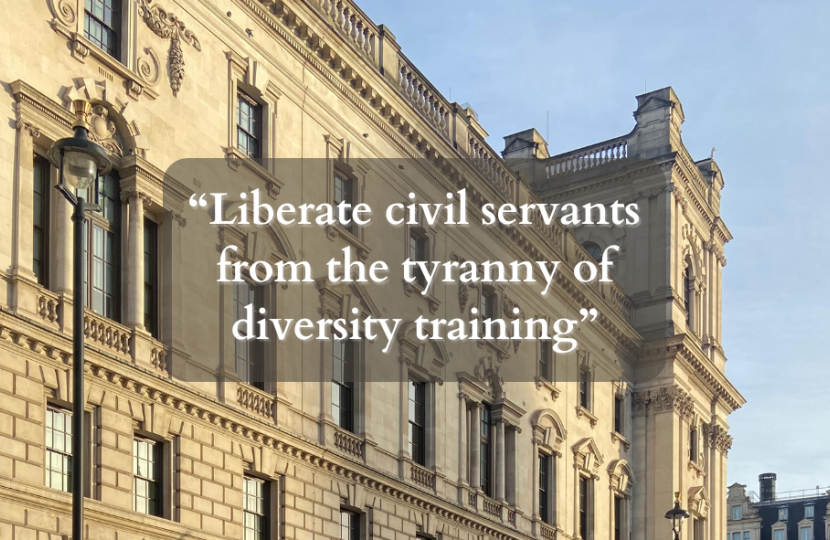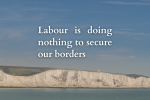
The Telegraph, 31st December 2024
Liberate civil servants from the tyranny of diversity training
The majority of Home Office workers are hard-working and impartial. They deserve better than the EDI agenda
Taxpayers funnel £20 billion annually into the Home Office – one of the largest budgets in government. This vast sum sustains an army of 40,000 civil servants engaged in immigration and asylum management, policing, and national security. Counter-terrorism, the National Crime Agency, and MI5 are all housed under its auspices. The 43 independent police forces operate on separate budgets, but beyond that, the Home Office’s sprawling remit is directed by the Home Secretary and Ministers, whom taxpayers might reasonably assume are prioritising crime-fighting, border control, and public safety.
How wrong they are.
While most workplaces in the private sector feature occasional diversity workshops as part of their corporate façade, the scale and ideology of the Home Office’s embrace of Diversity, Equality, and Inclusion (EDI) training is a different beast altogether. It was, ironically, The Telegraph’s investigative journalism that first brought these insidious programmes to my attention. As Home Secretary, I discovered, much to my horror, that the Home Office was haemorrhaging thousands of pounds not on its critical objectives, but on a burgeoning empire of ideological indoctrination masquerading as training.
When I initially probed my civil servant team about these activities, they reassured me these were a handful of optional, benign courses. “Nothing to trouble yourself with, Minister,” they said. But the reports kept coming. Each week unveiled fresh revelations: another obscure sub-directorate subjected to interminable woke workshops. It was as though I was playing a relentless game of whack-a-mole against a metastasising EDI agenda.
Determined to uncover the scale of this misuse of taxpayer funds, I demanded a comprehensive inventory of all EDI training, workshops, events, and groups. Weeks later, I received a voluminous spreadsheet – forty pages of it – cataloguing hundreds of sessions. I rolled up my sleeves and dug in, scrutinising every line to uncover the extent of this ideological capture.
What I found was galling. There were hours of presentations depicting the British Empire as a singular epoch of exploitation and oppression, requiring modern civil servants to atone for the alleged sins of their ancestors. Staff were warned that failing to invite every colleague to after-work drinks might constitute “unconscious bias”. The tone of emails, I learned, could be deemed harassment. There were “safe spaces” where officials could vent their emotional responses to government policy. Speaker events and training materials leaned heavily on the lexicon of activist dogma, promoting books like White Fragility and Why I’m No Longer Talking to White People About Race. The curriculum extolled “critical race theory” as gospel truth while ignoring the myriad contributions of the British Empire to global progress and prosperity.
When I questioned this, I was met with barely concealed derision. My inquiries about balance – about recognising Britain’s historic achievements alongside its flaws – were dismissed as reactionary. I was told that employees needed to “bring their whole selves to work.” I retorted that I neither wanted to see anyone’s whole self nor expected them to see mine. A professional environment is not a therapy session or a family dinner table; we are a workplace devoted to serving the public.
Let me be clear: the majority of civil servants I encountered were dedicated, professional, and politically neutral. Yet, it was undeniable that a culture of ideological orthodoxy had taken root, subverting the mission of the department. Some staff, emboldened by my stance, confided in me about the corrosive impact of EDI on immigration enforcement and policing policy. Others admitted they felt unable to voice dissent for fear of ostracism or career repercussions.
How did we reach this absurd juncture? Much of the blame can be traced to the fallout from the Windrush scandal – an appalling failure of the Home Office – that spurred an overcorrection. But the pendulum swung so far that the department traded competence for contrition, losing sight of its core responsibilities in the process. Teaching civil servants to view their history with shame and their identities as central to their work does nothing to restore public trust.
When I began dismantling these training programmes, the backlash was ferocious. Yet I was heartened by messages of support from civil servants who felt liberated. Regrettably, much of this progress was swiftly undone following my departure – a failure that still troubles me.
The solution is both simple and urgent. Government departments must prioritise professionalism over identity politics. Respect and inclusion are non-negotiable, but they should be the by-products of a culture that prizes competence, efficiency, and a shared sense of national purpose. Training should focus on delivering excellence, not indulging personal grievances or perpetuating divisive ideologies.
Radical reform is imperative. If we fail to challenge this institutional rot, we will betray the taxpayers who fund these departments and the values that underpin our democracy. The time for complacency is over. We must restore common sense and purpose to the heart of our civil service – before it’s too late.

